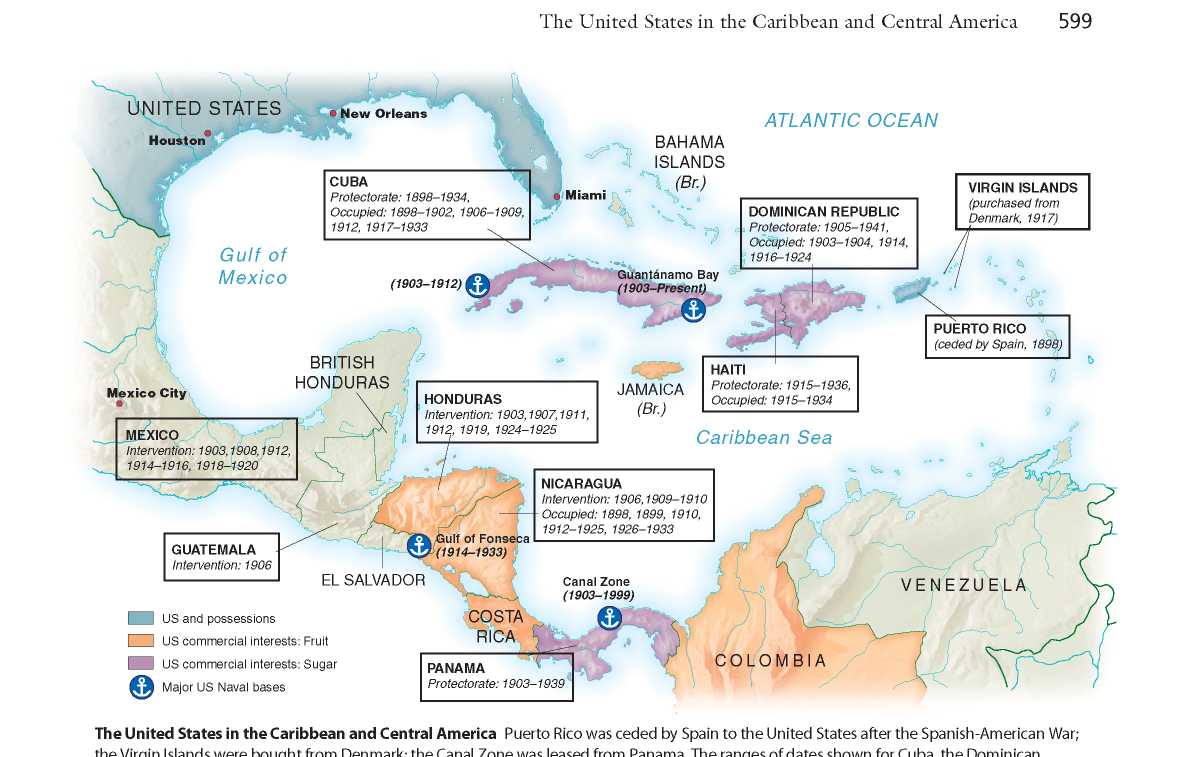If the purpose of the Spanish-American War had been to bring peace and order to Cuba, the Platt Amendment was a logical step. The same purpose soon necessitated a further extension of the principle, for once the United States accepted the role of protector and stabilizer in parts of the Caribbean and Central America, it seemed desirable, for the same economic, strategic, and humanitarian reasons, to supervise the entire region.
The Caribbean and Central American countries were economically underdeveloped, socially backward, politically unstable, and desperately poor. Everywhere a few families owned most of the land and dominated social and political life. Most of the people were uneducated peasants, many of whom were little better off than slaves. Rival cliques of wealthy families struggled for power, force being the usual method of effecting a change in government. Most of the meager income of the average Caribbean state was swallowed up by the military or diverted into the pockets of the current rulers.
Cynicism and fraud poisoned the relations of most of these nations with the great powers. European merchants and bankers systematically cheated their Latin American customers, who in turn frequently refused to honor their obligations. Foreign bankers floated bond issues on outrageous terms, while revolutionary
The United States in the Caribbean and Central America Puerto Rico was ceded by Spain to the United States after the Spanish-American War; the Virgin Islands were bought from Denmark; the Canal Zone was leased from Panama. The ranges of dates shown for Cuba, the Dominican Republic, Haiti, Nicaragua, and Panama cover those years during which the United States either had troops in occupation or in some other way (such as financial) had a protectorate relationship with that country.

Governments in the region annulled concessions and repudiated debts with equal disdain for honest business dealing.
In 1902, shortly after the United States had pulled out of Cuba, trouble erupted in Venezuela, where a dictator, Cipriano Castro, was refusing to honor debts owed the citizens of European nations. To force Castro to pay up, Germany and Great Britain established a blockade of Venezuelan ports and destroyed a number of Venezuelan gunboats and harbor defenses. Under American pressure the Europeans agreed to arbitrate the dispute. For the first time, European powers had accepted the broad implications of the Monroe Doctrine. By this time Theodore Roosevelt had become president of the United States, and he quickly capitalized on the new European attitude. In 1903 the Dominican Republic defaulted on bonds totaling some $40 million. When European investors urged their governments to intervene, Roosevelt announced that under the Monroe Doctrine the United States could not permit foreign nations to intervene in Latin America. But, he added, Latin American nations should not be allowed to escape their obligations. “If we intend to say ‘Hands off’ . . . sooner or later we must keep order ourselves,” he told Secretary of War Elihu Root.
The president did not want to make a colony of the Dominican Republic. “I have about the same desire to annex it as a gorged boa constrictor might have to swallow a porcupine wrong-end-to,” he said. He therefore arranged for the United States to take charge of the Dominican customs service—the one reliable source of revenue in that poverty-stricken country. Fifty-five percent of the customs duties would be devoted to debt payment, the remainder turned over to the Dominican government to care for its internal needs. Roosevelt defined his policy, known as the Roosevelt Corollary to the Monroe Doctrine, in a message to Congress in December 1904. “Chronic wrongdoing” in Latin America, he stated with his typical disregard for the subtleties of complex affairs, might require outside intervention. Since, under the Monroe Doctrine, no other nation could step in, the United States must “exercise. . . an international police power.”




 World History
World History




![Black Thursday [Illustrated Edition]](https://www.worldhistory.biz/uploads/posts/2015-05/1432470149_1431513568_003514b1_medium.jpeg)




